Coronavirus: New restrictions are 'too little, too late' - BMA
- Published
- comments
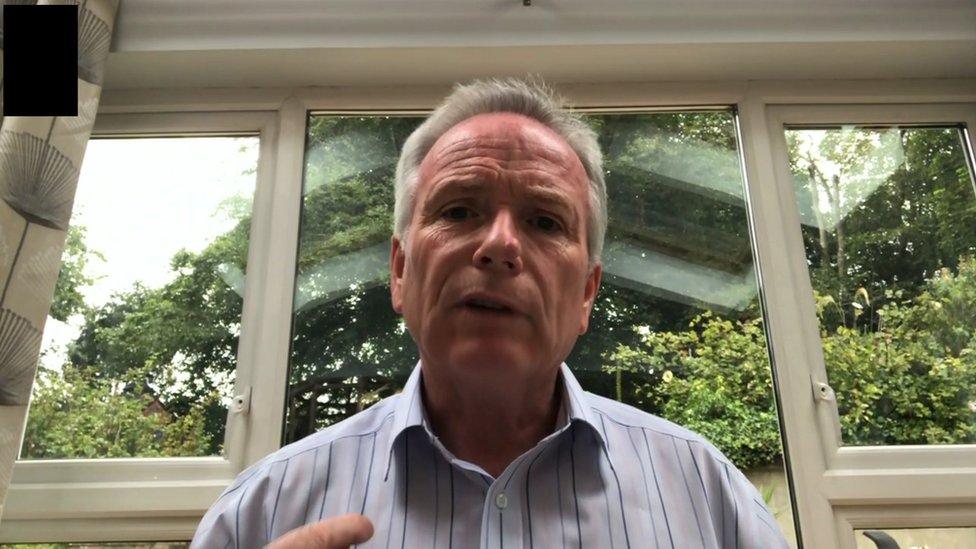
Dr Black said that hospital wards and potentially ICU could soon be overwhelmed
New coronavirus restrictions introduced by the executive are "too little, too late", the chair of the British Medical Association (BMA) in NI has warned.
"Following a virtual meeting with members the unanimous view is that restrictions weren't tough enough," Dr Tom Black said.
The Londonderry GP warned that hospitals could soon be overwhelmed.
It comes as it emerged up to 80 staff are isolating after an outbreak at a health centre in County Antrim.
The Northern Health Trust confirmed to the BBC there has been an outbreak involving staff working on the second floor of the Ballymena Health and Care Centre, where six staff have tested positive.
Schools will close from Monday and pubs and restaurants face new restrictions from Friday evening.
"This is the first time the BMA has come out not in agreement with Stormont," Dr Black told BBC Radio Foyle.
"The big concern is that we are going to be overwhelmed, particularly on hospital wards and, hopefully not, but possibly in ICU [intensive care units].
"That is why the Nightingale was open yesterday."
The virus focused facility in Belfast City Hospital's tower block, was re-opened on Wednesday due to Covid-19 pressures, having been stood down in May.
Two additional wards have also been opened at Derry's Altnagelvin Hospital to treat coronavirus patients, while a third ward has been identified for further admissions.
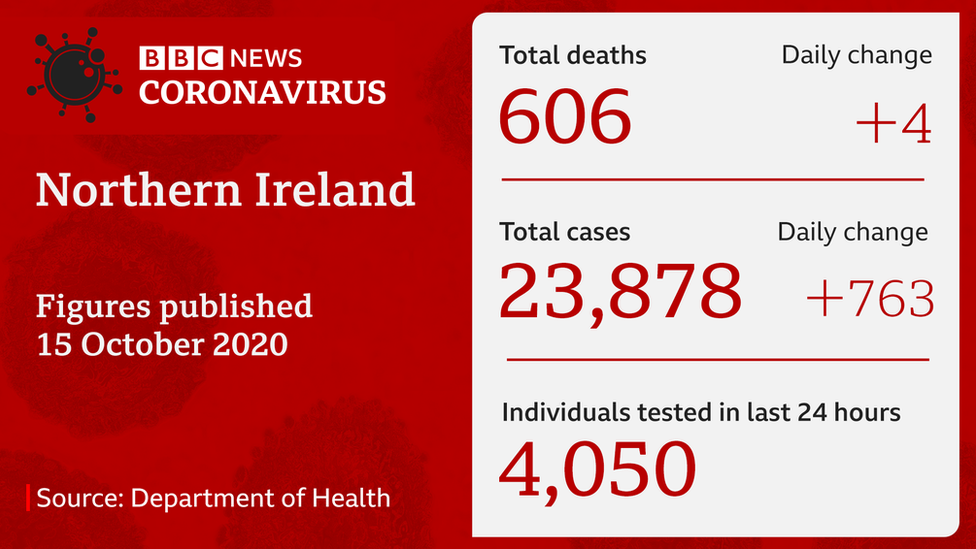
Earlier on Thursday, Northern Ireland's Department of Health reported the deaths of four more people who had tested positive for Covid-19.
It brings the department's overall death toll to 606.
Daily testing figures show that another 763 people have tested positive for the disease
Nothing to suggest 'patients impacted'
Meanwhile in the Ballymena Health and Care Centre the Trust said the staff are self-isolating are doing so to allow a contact-tracing exercise to be completed.
The second floor of the building is only accessible to staff via a security access system and it has now been closed to facilitate a deep clean.
A statement added: "At this stage we have no evidence to suggest that patients or service users have been impacted.
"Obviously this is an emerging situation and when we have a clearer picture we will provide further updates."
On Tuesday the Northern Trust confirmed up to 30 nurses at two of its hospitals - Antrim Area and Mid Ulster - were self isolating due to an outbreak of coronavirus. They confirmed three theatre nurses who worked across both sites had tested positive.
'Need to be much stricter'
The BMA chairman said restrictions should have been brought in weeks ago and have been more closely aligned with so-called level four restrictions in the Republic of Ireland.
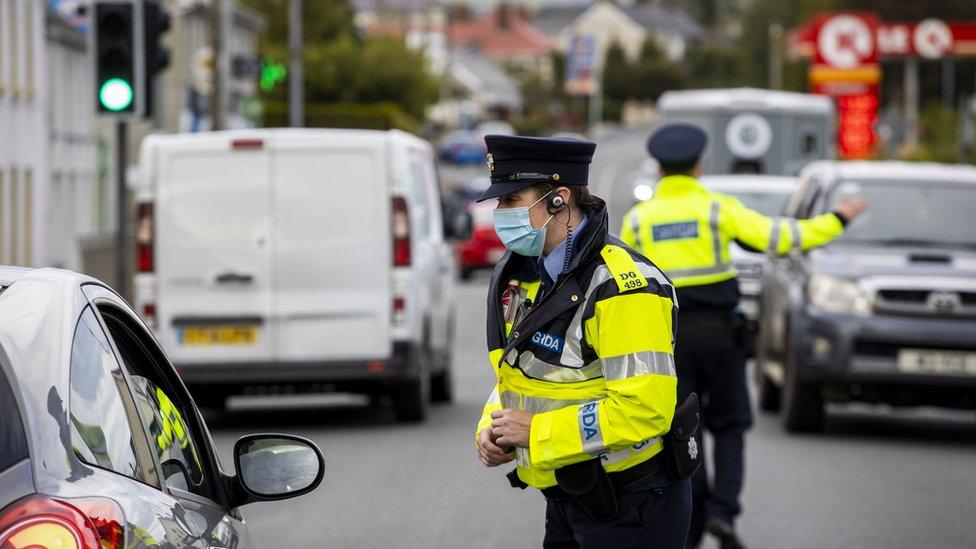
Donegal, pictured here, is one of three Irish counties where more severe restrictions have been imposed
The Irish cabinet has decided to move County Donegal, Cavan and Monaghan to the more severe restrictions for four weeks from Thursday, which means:
Non-essential businesses are closed
Visits to private homes and social gatherings are not allowed
Tánaiste (Irish deputy PM) Leo Varadkar has said he knows that the coalition government's decision to raise the Covid-19 levels on the Republic's three Ulster counties "will come as a bitter blow", but that the vast majority of people will understand why the decision was taken.
Speaking in the Dáil (Irish parliament) Mr Varadkar said those living in other Irish counties "should not get the wrong impression" and they too need to comply with public health advice.
"I think sometimes, when people hear that three of the border counties have gone up to Level 4, they may get the wrong impression that this is a problem 'up north' or along the border. It is not.
"People in any part of the island should not take any comfort from the fact that the rules are stricter in these three counties. This virus is circulating in the community in every county in Ireland."
'Much stricter'
Dr Tom Black said he did sympathise with politicians, because they have to consider education and the economy as well as healthcare.
However, he added: "I think we need to be much stricter than what Stormont is telling us."
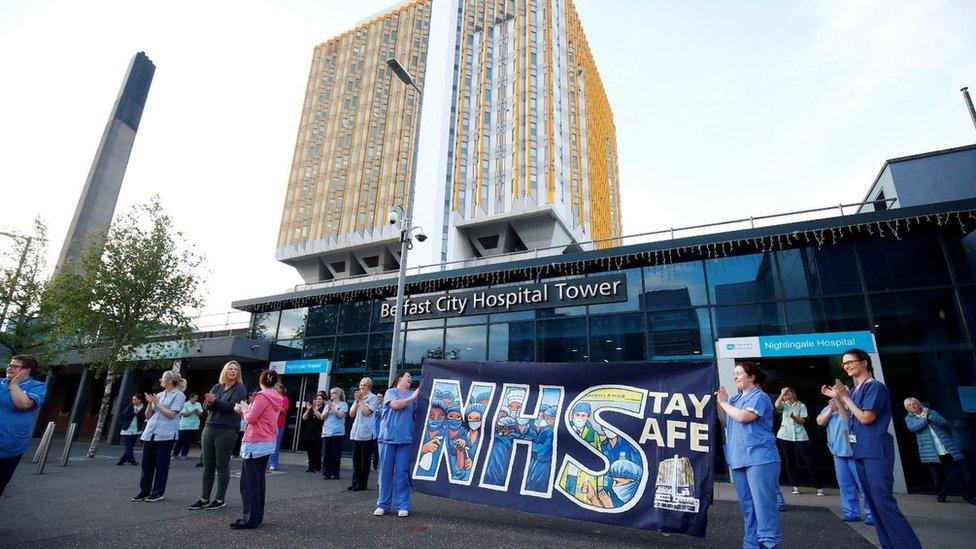
The regional Nightingale facility at Belfast City Hospital's tower block was temporarily stood down in May
"There is a real pressure on the system here and there will be throughout Northern Ireland in terms of having capacity," Dr Black said.
The rise in cases has been compounded by many hospital staff having to self-isolate or are off due to sickness, said the Derry GP.
"I saw yesterday that 460 staff are off sick or are self-isolating out of the Western Trust... so that means there could be thousands of staff off across Northern Ireland."
Derry restrictions 'effective'
In Derry and Strabane, one of the UK's worst affected areas, there are signs of slowing of the increase in infection rates, according to Northern Ireland's chief scientific advisor.
Prof Ian Young said cases had been doubling "every three days", but that this was now taking much longer - suggesting restrictions were having an effect.
"Stopping the transmission of the virus is a bit like turning around an ocean liner," he said.
A number of so-called super spreader events could have led to the outbreak of Covid-19 in the north west, added Prof Young.
"Somebody who was particularly infectious who was in contact with a number of people and spread the virus to them, but currently we don't know where those events happened," he said.
"Also, widespread community transmission and a lot of clusters also occurring in household settings."
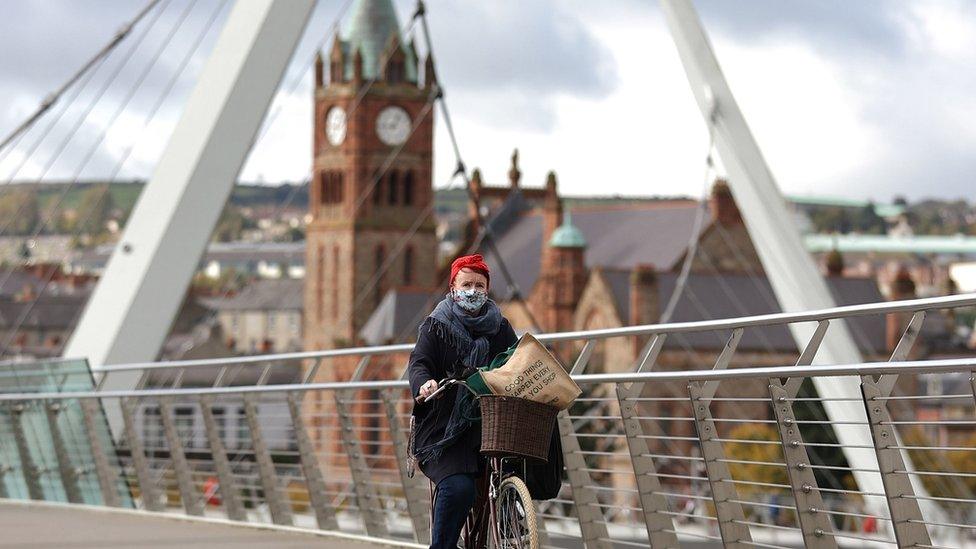
Derry City and Strabane District Council area has one of the highest rates of infection in the UK
However, Dr Black said he believed the reason for the possible downturn in case numbers was down to the public closing down before being instructed to do so by Stormont ministers.
"While restrictions came in last week, people in Derry and Strabane closed down in a much stricter fashion before that and I think we are seeing a slowing down and a flattening of the curve," he said.
"We are seeing the benefit of that and I think in many ways the people have been ahead of the politicians on this."
On Wednesday, the Department of Health recorded a further 1,217 cases and four more deaths with Covid-19.
There have now been 23,115 cases since the pandemic began - a quarter of which have been reported in the past week.
In the Republic of Ireland, a further 1,205 new coronavirus cases were confirmed on Thursday as well as three additional deaths.


Schools: How are pupils being kept safe?
Weddings: How many people can attend?
Going out: When and how are pubs allowed to open?
